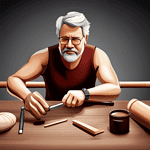Do you need clarification about the difference between hobbies and interests? While people use these terms interchangeably, the two have distinct differences. Hobbies are leisure activities you enjoy in your free time, while interests are passive.
Understanding Hobbies And Interests
Hobbies are leisure activities that you enjoy doing in your free time. They are often done for fun and relaxation rather than for a specific purpose. Hobbies can be anything from playing a musical instrument to collecting stamps or coins.
One of the benefits of having a hobby is that it can help you relieve stress and improve your mental health. When you engage in an activity you enjoy, your brain is triggered to release endorphins, which can help you feel happier and more relaxed. Hobbies can also help you develop new skills and interests and provide a sense of accomplishment.
Another vital aspect of hobbies is that they are often social activities. Many hobbies involve interacting with other people who share your interests, which helps you build new friendships and strengthen existing ones.
It’s important to note that hobbies are different from interests. While hobbies are activities you actively engage in, interests are things you enjoy learning about or following but may not necessarily participate in. For example, you may be interested in astronomy but have yet to have a hobby of stargazing.
Interests can be broad or specific. You may have a general interest in science or a particular interest in marine biology. It’s important to note that interests can change over time. What you were interested in as a child may differ from what you are interested in now.
You can also categorize interests can as personal or professional. Personal interests are things you enjoy doing in your free time, while professional interests are related to your career or field of work.
Understanding your interests is essential because they can help you decide about your personal and professional life. For example, if you have a strong interest in art, consider pursuing a career in the arts or incorporating art into your personal life as a hobby.
Overall, understanding your interests can help you lead a more fulfilling life by allowing you to participate in leisure activities that bring you joy and satisfaction.
Critical Differences Between Hobbies and Interests
Time Investment
One of the main differences between hobbies and interests is the amount of time you invest in them. Hobbies are activities you do for fun and relaxation, and you may dedicate little time to them. On the other hand, interests are things you are passionate about and may require a significant time investment.
For example, reading can be a hobby, and you may read a book or two a month. However, if you are interested in literature, you may spend hours reading, researching, and discussing books every week.
Passion and Engagement
Another difference between hobbies and interests is your passion and engagement level with them. Hobbies are activities you enjoy, but they may not necessarily be your passion. You may engage in hobbies to relieve stress or pass the time.
Interests, on the other hand, are things that you are passionate about. You may feel a sense of excitement and fulfillment when you engage in your interests. You may also actively seek opportunities to learn more about your interests and connect with others who share your passion.
Purpose and Benefits
Hobbies and interests also differ in their purpose and benefits. Hobbies are often pursued for their own sake and may have little tangible benefits. For example, painting can be a hobby that you do for fun, and it may have little practical use.
Interests, on the other hand, often have a purpose and can provide a range of benefits. For example, if you are interested in health and fitness, you may pursue a career or use your knowledge to improve your health.
Impact on Personal Identity
Finally, hobbies and interests can have different impacts on your identity. Hobbies may not be a significant part of your identity, and you may not define yourself by them. Conversely, interests can be a core part of your identity and shape how you see yourself. Our guide How Hobbies Shape Your Personality further explains the impact on personal identity.
For example, if you are interested in environmentalism, you may define yourself as an environmentalist and make choices based on that identity. Your interests can also influence your values and beliefs and shape how you interact with the world around you.
Common Misconceptions
When it comes to hobbies and interests, there are several misconceptions that people often have. Here are a few common ones:
- Hobbies and interests are the same thing. While hobbies and interests may overlap, they are not the same thing. Interests are things you enjoy learning about or following, while hobbies are activities you actively participate in for pleasure or relaxation.
- Hobbies need to be productive or useful. This is not true. Hobbies are meant to be enjoyable and fulfilling and do not need to serve any practical purpose. Whether you enjoy knitting, playing video games, or collecting stamps, it’s a valid hobby if it brings you joy.
- You can only have one hobby. Many people believe they must focus on one hobby and become an expert. However, having multiple hobbies and switching between them is perfectly fine, depending on your mood or interests.
- Hobbies are a waste of time. This is a common misconception that couldn’t be further from the truth. Hobbies are a great way to reduce stress, improve mental health, and foster creativity. Engaging in hobbies can also help you develop new skills and be a great way to meet new people and form connections with others who share your interests.
How to Identify Your Hobbies and Interests
Identifying your hobbies and interests can be a fun and rewarding process. Here are some steps to help you get started:
- Start with a brainstorming session. Take a few minutes to write down everything that comes to mind when you think about your hobbies and interests. Don’t worry about organizing or prioritizing your list at this point.
- Narrow down your list. Look at your brainstorming list and identify the items that you are most passionate about. These hobbies and interests bring you the most joy and fulfillment.
- Consider your strengths and skills. Think about the activities that you excel at or enjoy doing. These may be related to your hobbies and interests.
- Look for patterns. Are there any common themes or activities that appear on your list? For example, you may be passionate about outdoor activities if you enjoy hiking, camping, and rock climbing.
- Try new things. Feel free to try new activities or hobbies. You may discover a new passion that you never knew you had.
The Role of Hobbies and Interests in Personal Development
Your hobbies and interests can play a significant role in your personal development. They can help you discover new skills, interests, and passions and provide a sense of fulfillment and accomplishment. An interest can become a hobby if you start engaging in it regularly and enjoy it. For example, if you are interested in photography, you might start taking pictures in your free time and eventually develop it into a hobby.
Benefits of Hobbies and Interests
Hobbies and interests can have numerous benefits, make you a more well rounded and interesting person, which can be appealing to potential employers or social connections. It can also provide a healthy outlet for stress and improve your overall well being as well as:
- Stress relief: Engaging in a hobby or interest can help you relax and reduce stress.
- Improved mental health: Pursuing a hobby or interest helps boost your mood and overall mental health.
- Increased creativity: Hobbies and interests can help stimulate your imagination and creativity and encourage you to think outside the box.
- Enhanced social skills: Engaging in a hobby or interest can provide opportunities to meet new people and develop social skills.
- Improved physical health: Certain hobbies and interests, such as sports or outdoor activities, can improve your physical health and fitness.
Final Thoughts
Hobbies and interests are two distinct concepts that often need clarification. Hobbies are activities that you engage in for pleasure or relaxation, while interests are topics or subjects that you find fascinating or engaging.
Understanding these two concepts’ differences is essential as each can impact your life differently. Hobbies can provide you with fulfillment and enjoyment, while interests can help you develop new skills and knowledge.
Frequently Asked Questions
How do hobbies differ from passions?
While hobbies and passions are enjoyable, passions are often more intense and all consuming. As you feel strongly about a passion, you willingly make a deeper commitment and invest time and energy into pursuing it.
What are some examples of hobbies and interests?
Some common hobbies include gardening, painting, playing sports, reading, and cooking. Interests, including history, science, music, or travel, can vary widely.
What should I consider when listing hobbies and interests on my CV?
When listing hobbies and interests on your CV, choose ones relevant to the job you are applying for. For example, if you are applying for a career in marketing, highlight your interest in social media or photography. It’s also important to be honest and authentic when listing your hobbies and interests.






